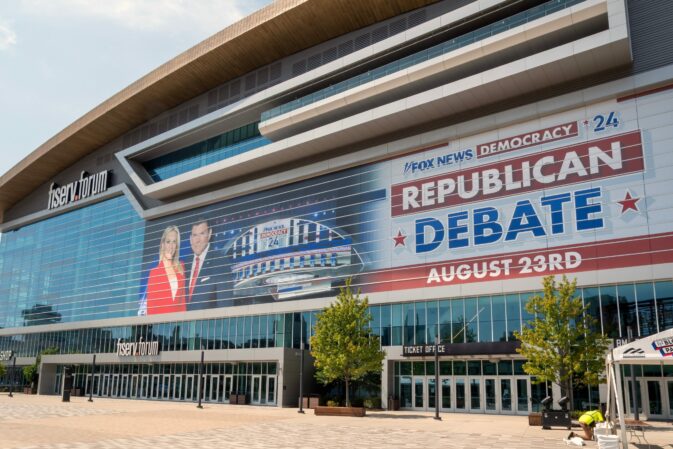What small businesses want to hear from the GOP debaters

There’s no shortage of issues to address at Wednesday’s Republican presidential primary debate. These include Donald Trump’s absence, Department of Justice corruption, the Russia-Ukraine War and the latest in the culture wars.
Small businesses hope these newsy topics don’t overwhelm discussion of pocketbook issues that have a far bigger impact on Americans’ day-to-day lives. Ordinary folks want candidates to explain how they’d counter Bidenomics while expanding economic opportunity and well-being.
Bidenomics has caused historic and persistent Bidenflation that has hit small businesses and their customers especially hard. Since Biden took office, prices of goods and services have increased by 17 percent, food has risen by 20 percent and prices at the pump are up by more than 50 percent. The average household is spending nearly $1,000 more per month. According to JCNF’s latest SBIQ poll of national small businesses, inflation is by far the biggest concern respondents face. They want to hear how candidates would slay Bidenflation.
The Federal Reserve’s aggressive interest rate hikes have moderated inflation but have simultaneously curtailed access to credit, preventing many small businesses from surviving and thriving. Rate hikes have disproportionately hurt small banks that make 60 percent of all small business loans. Several banks have been forced to close, and many more have had their financial outlooks downgraded. Small businesses want to hear about how the candidates would increase access to credit needed on Main Street.
Bidenomics is merely a euphemism for the left’s same old command and control socialist framework that picks winners and losers. Exhibit A is the Biden administration’s industrial policy that redirects hundreds of billions of dollars from the productive private sector to the crony green energy sector. This reduces economic growth in non-politically connected communities while driving up energy prices.
Small businesses want to know how the candidates would fight this war on traditional energy and lower their electricity bills. Ordinary Americans want the end of $4 a gallon gas, not the end of gas-powered vehicles. More broadly, we want answers on how Republicans plan to protect small businesses from the unaccountable administrative state whose nonstop environmental and labor regulations prevent entrepreneurship.
Then there’s the specter of tax increases. The small business and individual provisions of the Tax Cuts and Jobs Act are set to end at the end of 2025, and some aspects, such as immediate expensing, have already begun to expire. How would a Republican presidential nominee make these tax cuts permanent and overcome the left’s incessant “tax cuts for the rich” objections? Small businesses want to know.
The answers to key small business questions are contained in JCN’s American Small Business Prosperity Plan, an eight-point policy playbook to get the economy working for everyone again. For example, it calls for ending reckless spending to reduce inflation, a drill-baby-drill energy policy to bring down gas and electricity prices, a moratorium on new small business regulations, and making the TCJA permanent. The candidates should use it as their cheat sheet for Wednesday’s debate and their campaigns in general.
More broadly, small businesses and ordinary Americans will be looking at debaters’ broader vision for the party to overcome Democrats’ vote-buying platform and attract enough support to win on Election Day. Candidates should seize the opportunity to speak directly to the American public without the antagonistic media’s filtering.
As I recently argued, the first step in this branding exercise is to change the party’s name from the Grand Old Party to the Great Opportunity Party. This name better reflects the party’s priorities and spreads a positive and uniting message to voters who may not have heard it before. The Great Opportunity Party channels the American Dream and growing living standards for all.
This is what small businesses sick of the Trump drama and the culture wars want to hear Wednesday night.




